Harmen van den Bogaert
An Early Member of New York's Gay Community
"An old man approached me and laid his hand upon my heart to feel it beat; and then he shouted we really were not afraid at all."
a Mohawk measured his courage in 1634.
Had Harmen Meyndertsz van den Bogaert lived four hundred years later, he would have been a member of an accepted community contributing to the vibrancy of New York. But he lived in a more intolerant time.
Arriving about 1630 at the tender age of eighteen, Bogaert became one of Manhatttan's first surgeons, barber too since in those days the fellow who deloused your hair also bled you when you took sick. For nearly twenty years, he was a respected citizen of the town, owning a house on today's Stone Street, raising four children with his wive Jelisje, inheriting a plantation and investing in the privateer La Garce.
In 1634, Bogaert was named as an ambassador to the Mohawks. In the middle of winter, he and two companions undertook the arduous journey into Mohawk country. Their assignment was to restore the fur trade, disrupted by what the Mohawks considered prices that cheated them out of their beaver and a crooked head of the Dutch trading post at Fort Orange. Frenchmen eager to claim the fur trade for themselves stirred the Mohawk's anger. By all accounts, the mission was a success, and in the bargain, Bogaert left us a journal that sheds much light on the life of the Indians he visited.
But in 1647 upriver at Fort Orange, today's Albany, Bogaert was caught in what the Dutch considered an unnatural position with a young slave named Tobias, becoming an early member of New York's gay community. The offense was a capital crime. Director Stuyvesant himself determined to intervene in the sentencing. Knowing the fate awaiting him, Bogaert fled to the Mohawks. Cornered by the Dutchman sent after him, he set fire to the Indians' house, burning it to the ground will all their furs and sewan stored inside.
Caught and hauled back to jail, Bogaert escaped once again. But his luck had run out. Crossing the river, he fell through the ice and drowned.
For a look at another successful Dutchman running afoul of his society's moral code, read The Company's Reward, the story of Justus Schouten, a Dutch merchant who lived in Siam from 1624 to 1636.
Bill's Books
The Mevrouw Who Saved Manhattan
A Novel of New Amsterdam by Bill Greer
A "romp through the history of New Netherland that would surely have Petrus Stuyvesant complaining about the riot transpiring between its pages ... Readers are guaranteed a genuine adventure that will evoke the full range of human emotions. Once begun, they can expect to experience that rare difficulty in putting down a book before they have finished."
-- de Halve Maen, Journal of the Holland Society of New York
About the Book
_________________________
A DIRTY YEAR
Sex, Suffrage & Scandal in Gilded Age New York
A nonfiction narrative of 1872 New York, a city convulsing with social upheaval and sexual revolution and beset with all the excitement and challenges a moment of transformation brings.
From Chicago Review Press, 2020
More on the Book

